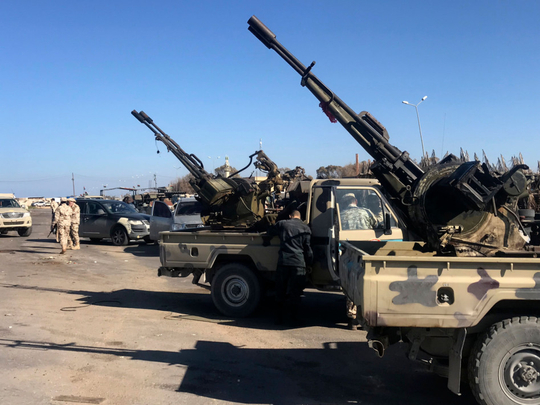
Egypt’s suggestion that it now has the international legitimacy to intervene in the Libyan crisis represents a major shift in the multiparty struggle in the most complex conflicts in North Africa today.
Egyptian President Abdel Fattah Al Sisi is right to underline the geopolitical threat to his country’s national security as a result of the recent military developments that saw the Libyan National Army (LNA) lose grounds in western Libya and the Turkish backed forces and militias of the Government of National Accord (GNA) inch closer to the strategic city of Sirte and the nearby airbase of Al Jufra.
What exactly President Al Sisi’s next move will be remains to be seen. An outright military incursion by the Egyptian army, at the behest of the Tobruk legislature, headed by speaker Agilah Saleh, is one option.
President Emanuel Macron warned Monday that Turkey is playing a dangerous game in Libya. This is taking place as an EU spokesperson declares that the organisation is not party to the Libyan conflict
But it is an option that is fraught with challenges and caveats. The last thing that Cairo needs at this stage is to find its army embroiled in the complex and protracted Libyan conflict.
Al Sisi declared this week that Sirte and Al Jufra represent a red line for Cairo. The GNA forces are at the outskirts of Sirte but are yet to make a move to capture the gateway to the oil crescent region which is still under the control of the LNA under Gen Khalifa Haftar.
The GNA, headed by Fayez Al Sarraj, has rejected an initiative launched by Sisi earlier this month calling for an immediate ceasefire and a return to dialogue. Meantime Haftar is in control of most of eastern Libya, including Benghazi. Russia too has been lending support to the LNA.
Until earlier this year Haftar’s forces were at the gates of the capital Tripoli. In April Haftar absolved himself of the 2015 Skhirat agreement which created the GNA.
Turkey’s intervention
It was Turkey’s direct military intervention in January that was a tipping point. President Recep Tayyip Erdogan dispatched thousands of mercenaries and Turkish military advisers to rescue Sarraj and his government.
The last attempt to forge a road map for peace in Libya was made in Berlin last January and it stressed that only a Libyan-led and Libyan owned political process can end the conflict and bring lasting peace.
President Al Sisi’s proposed initiative underlined the importance of the Berlin process and the need to find a political solution to end the nine-year conflict.
But unfortunately Libya has become a struggle to alter geopolitical realities. Washington continues to recognise the GNA but is also backing Turkey’s involvement as a counterbalance to Moscow’s push into Libya. This week it reiterated its support of Al Sisi’s initiative.
A divided EU
The EU is also divided on the Libyan crisis with France taking a strong position against Turkish role in Libya while Italy supports the GNA and is coordinating moves with Ankara.
President Emanuel Macron warned Monday that Turkey is playing a dangerous game in Libya. This is taking place as an EU spokesperson declares that the organisation is not party to the Libyan conflict.
It is clear that Turkish designs in Libya go beyond supporting the GNA. Erdogan has plans for establishing a permanent presence in Libya while cashing in on maritime oil drilling rights in Libyan waters and in disputed areas of the Eastern Mediterranean.
Putin's gambit
On the other hand, President Vladimir Putin is also using the fact that US influence in the region is waning and is bolstering his presence in Libya.
The sad fact is that the internationalisation of the Libyan conflict has come at the expense of the Libyan people and their sovereignty. With so many parties having opposite agendas in Libya it is difficult to see a road map towards reaching a political settlement being implemented any time soon.
On Monday Tunisian President Kais Saied suggested that the GNA’s legitimacy is temporary and should be replaced by a new one, warning against the partition of Libya.
Speaker of the Tobruk parliament Saleh may become the new interface for any future negotiations.
After nine years of war and unrest the Libyan people must embrace a political solution to the conflict. This means that foreign players must step back and allow the Libyan people to write a new constitution for the war-torn country.
One country that can play the role of an honest broker could be Algeria, which under President Abdelmajid Tebboune, has urged all Libyans to find a common ground away from foreign intervention. Tebboune met this week with GNA’s Sarraj and last week with Saleh in a bid to restart dialogue.
His warning to both sides that Libya could face a Syria-like scenario must be taken seriously before it is too late.
—Osama Al Shairif is a journalist and a political commentator based in Amman.







